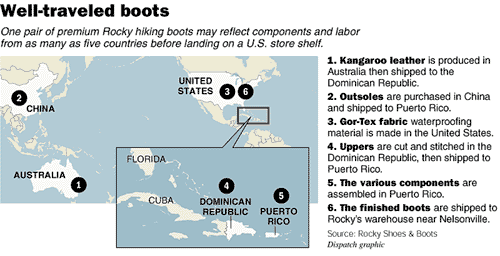|
 |
|
Esta página no está disponible en español. THE COLUMBUS DISPATCHCheaper Labor Moves Rocky Shoes Production To Puerto Rico, Puerto Ricans One Rung On Globalization Ladder
Cheaper Labor Moves Rocky Shoes Production To Puerto Rico May 10, 2002 After nearly 70 years in Nelsonville, Ohio's last shoe factory has closed, bowing to the lure of cheaper labor in Moca, Puerto Rico. The Dispatch looks at how the people of Rocky Shoes & Boots -- and their communities -- are coping with the tumultuous change that accompanies even a small-scale act of globalization.
Rocky Clocks Out: Cheaper Labor Moves Rocky Shoes Production To Puerto Rico By Rita Price April 28, 2002 NELSONVILLE, Ohio (AP) - The tears fell and the applause was faint as the last pair of boots from Rocky Shoes & Boots slid down the assembly line in November.
Judith Collins, an employee since the 1960s, boxed them up. With that, the 69-year-old company with deep roots in this southeast Ohio community ended production here and moved it to Moca, Puerto Rico. "I've been here 36 years," said Collins, 61. "I wanted four more, and then to retire. This is the only job I've ever had." Workers who spent a lifetime crafting footwear now find their skills aren't needed, as shoe companies nationwide have moved to foreign markets with cheaper labor. Rocky Shoes followed suit last fall. Moving its 67 remaining Nelsonville manufacturing jobs was the only way for publicly held Rocky Shoes to thrive and compete, company President Mike Brooks told The Columbus Dispatch for a story Sunday, the first of a three-part series. "When we measure productivity, we still can't duplicate Nelsonville in the Dominican, we can't duplicate it in Puerto Rico and I don't think it can be duplicated anywhere," Brooks said. "That - the productivity - is one side of the numbers game. The sadness is, it's not enough." Getting a shoe made in Nelsonville, an Appalachian town with 5,230 people, costs about $11 an hour. In Puerto Rico, the rate is $6; in the Dominican Republic, $1.25; in China, 40 cents.
At home after work, Rocky employee Julio Lopez ---------- Because of costs, fewer than 25,000 shoe jobs remain in the United States, down from 235,000 in 1972, the Department of Labor said. "History shows that it is impossible to stop this trend," said Oded Shenkar, a professor of global business management at Ohio State University. "Highly developed economies just will not be very competitive in labor-intensive fields. In the long term, it is doomed." Shenkar said some small communities such as Nelsonville are forced to pay the price for free trade. "Perhaps what we need to do is help the displaced worker a bit more. I think that's fair," he said. None of Rocky Shoes' shoemakers, most members of the Union of Needle Trades, Industrial and Textile Employees Local 146, were offered replacement jobs. The company's corporate headquarters and retail store remain in Nelsonville. "I put my time in here. I worked hard. I thought we had given Nelsonville something to be proud of," said shoemaker Carl Bruce. "Rocky Boots was Nelsonville and vice versa. It didn't have to be this way, I don't think." Bruce, 57, is the middle sibling in a trio of brothers who started work at the factory as young men and left as grandfathers. "I would love to have retired from the shoe industry," he said. "I thought it was going to hang on another 10 or 15 years." Rocky Shoes, which was founded in 1932, bringing jobs to a struggling region during the Depression, did turn out to be the last-surviving shoe factory in Ohio. However, Brooks' family didn't think their business would last as long as it did. In 1959, William Brooks sold to the Irving-Drew Shoe Corp., based 30 miles northwest in Lancaster. "His vision was that imports were going to destroy the American shoe industry," Mike Brooks said of his uncle. "And to a certain extent, he was right. He encouraged his five children to get an education and get out of Dodge." John Brooks, Mike's father, loved making shoes and stayed on as an employee. He bought the company back in 1975 for about $640,000. "He somehow got four banks to loan him money on a company that was losing money," Mike Brooks said. Turning work to plants overseas kept the business going. Leather uppers were stitched in South Korea as early as the 1970s. The company first ventured into the Caribbean about 15 years ago. "It was a quiet way to try to enhance profits," Brooks, 55, said. "We didn't tell our customers."
Once Made In America: 'It All Changes' Puerto Ricans One Rung On Globalization Ladder By Rita Price April 29, 2002 MOCA, Puerto Rico -- Fastened to the right side of his big, black, very old sewing machine is a small piece of paper filled with neat, pencil-drawn tally marks. Blank at 6 a.m., when Julio Lopez first put foot to pedal and needle to leather, by noon the note has grown dark with lines and slashes. Shoe factories long ago added glowing electronic clocks to track the number of pairs made, but Lopez still heeds the gentle force that compels him to keep a handwritten record, to measure the progress of his workday in a more personal, ritualistic way. So he counts, by the dozens and the hundreds and eventually the thousands, and prays that at least eight more years of this sewing and scribbling will pass before his machine is packed up and sent away. "Then I will be 62, and I can retire," the shoemaker says with a smile. He'll be free of the worry, now ever-present, that another country's cheap labor again will lure away his job. Lopez is no expert on globalization, but for many years now the 54-year-old grandfather has played a shifting, unwitting role in a seesawing marketplace known today as the world economy. He left the Caribbean island as a young man and began working at a stuffed-toy factory in New York City but lost the job when the company moved to Puerto Rico. He returned to Puerto Rico six years later with a wife in tow and learned that the toy factory had moved again, this time to China. Lopez started making shoes and boots for Wolverine World Wide, which had moved much of its manufacturing from the U.S. mainland. He held the job for 23 years, even traveling to the company's Michigan headquarters for training, but lost his position when Wolverine moved again last May. He has another job now, sewing for Rocky Shoes & Boots, in large part because some worker in Nelsonville, Ohio, lost his. "Where does it end?" asked Ruth Tanenbaum, a controller in Puerto Rico for Lifestyle Footwear, Rocky's subsidiary there. "It's like the world is closing in on everyone -- the world isn't big enough anymore," she said. "Yet everybody wants to know why things can't stay the same. Why can't they stay the way they were? Well, nothing does. It all changes." Turmoil and travel With U.S. manufacturing down an estimated 1.2 million jobs during the past 10 years alone, it's no surprise to see many of those positions being sprinkled, and re-sprinkled, around a jobs-hungry world. The story of globalization is one of walls coming down, of the rise of a new economic order that should, many economists argue, eventually lead to a greater good. But it's also a story about workers who lose their livelihoods, about businesses pressured into agonizing decisions and about entire communities caught unprepared for sometimes-staggering upheaval. For 36-year-old Paul Sufronko, one of Rocky's Ohio employees, the experience has been rife with turmoil and travel. The Athens County native had never been on a plane before this winter, when he began making regular, 1,800-mile trips to the Caribbean basin to work at Rocky's plants in Moca and La Vega, Dominican Republic. He left his family behind for weeks at a time, lived out of a hotel, worked long days surrounded by a language he doesn't understand and, most important, trained someone else to do his job. "I had other dreams," Sufronko deadpanned one night after a long shift in Moca. "Things just didn't work out." On Nov. 21, the day before Thanksgiving, Rocky closed its landmark Nelsonville plant, a beloved Athens County fixture since it opened in 1932. Sufronko, a maintenance supervisor, handed out final paychecks to most of the 67 employees -- all who remained of a proud force of top-notch shoemakers that once numbered in the hundreds. For several years, the Nelsonville jobs had been trickling overseas, moving to larger, busier Rocky plants that opened in the mid-1980s in Puerto Rico and the Dominican Republic. Sufronko said he would receive his own last check after helping assemble the Nelsonville equipment in the Dominican and in Puerto Rico -- where Julio Lopez knows that southeastern Ohio's misfortune is, at least temporarily, his community's gain. "This is all part of a bigger thing, and that, of course, is where the problems start," said Oded Shenkar, a professor of global-business management at Ohio State University. "Who is paying for free trade? Not everyone equally. There are regions who pay much more than others, there are nations that pay much more and, finally, there are individuals." People and places long known for the goods they produce are suffering identity crises. Dexter Shoe just stopped making shoes in Dexter, Maine. The all-American candy factory, Life Savers, is leaving Holland, Mich. Ohio-based Huffy Corp., the nation's No. 1 bicycle maker, surrendered to cheaper Asian labor. And Rocky, once the largest, most important employer in jobs-poor Nelsonville, has become the largest, most important employer in jobs-poor Moca. For now. Pressure to succeed Lillian Chaparro charges through the Moca factory at a brutal pace, answering nonstop questions and shouting directions on the run. Her smooth, tawny face is often flecked with bits of black polyurethane and dust, the result of frequent, up-close inspections. At age 35, Chaparro has earned two master's degrees and worked her way up from office receptionist to plant manager. A native of Puerto Rico, she speaks of her employees warmly, as if they are family, but she can't stand coddling, trying instead to impress upon them the importance of swift, high-quality shoemaking. "Every contract, for us, is critical," Chaparro said, referring to the mammoth job at hand, an order for some 180,000 boots for the U.S. military. Such efforts must take on the highest priority. Without them, Chaparro knows, Rocky has no reason to stay in Puerto Rico. Duty contracts generally are orders from either the military or the U.S. Postal Service, which stipulate their footwear cannot be made in a foreign country. Because Puerto Rico is a commonwealth of the United States, its laborers -- who at roughly $6 an hour cost Rocky a little more than half the old Nelsonville rate -- boost the company's bottom line and satisfy Uncle Sam's preference for American-made goods. Many of the boots made in Moca during the past year are keeping troops warm in Afghanistan. They also are keeping Rocky from moving entirely to the Dominican, where an hour of shoe labor costs about $1.25, or China, where it goes for 40 cents. "It's like a chain, you know?" Chaparro said. "The jobs leave the U.S. They come here. Then they go to the Dominican, to China. That's why I push people -- we have to be able to compete." She is clear-eyed and candid about her position, joking that, without a husband and children to cement her ties to the island, she may find herself packing a bag one day for Asia. Puerto Ricans in many ways seem less naive about the realities of shifting markets than their blue-collar counterparts on the mainland. Or perhaps they just take the matter less personally. "When I went to Nelsonville, no one would speak to me," Chaparro said, describing the trip she took in the fall to learn about the manufacturing processes that would soon move to her plant. "There I was alone, in this place where I was so cold and shivering I couldn't move my jaw, and everyone was angry at me," she said. "Finally I said: 'Look. What's happening to you is happening to us, too. I'm sorry, and I understand how you feel, but in Puerto Rico there are a lot of closed factories, too.' " Many, if not most, of the shoemakers at Rocky's Moca plant have lost jobs elsewhere. According to a recent survey in a Puerto Rican business journal, nearly 24 percent of respondents reported losing a job in the past year. And 70 percent said they fear losing a current position. The island's tie to the United States brings many advantages, but sharing U.S. currency and markets has created a high cost of living in Puerto Rico without the corresponding high wages. Massive social-welfare programs are used to plug the gap. Lopez, for example, earns much respect for his seniority and skill but no more pay than the 20-somethings who took up the trade a year ago. At Rocky, he started out at $5.15 an hour -- the same minimum wage that applies on the mainland -- and works without the benefit of a labor union or medical insurance. Still, "This is a good job, a place with beautiful work and nice people," Lopez said, explaining that he considers himself quite lucky not to be adding to Moca's 18 percent unemployment rate. Because of his experience, Rocky recruited Lopez as soon as Wolverine closed last spring. He walked out of one factory and into another the next day, an increasingly rare feat in Moca and an all-but-impossible one in Nelsonville. "That was in May," he said, "and some of the people I worked with still have not found another job." The final day of production at the Wolverine plant, like the final day at Rocky's Nelsonville plant, was awful. "So much sadness, so much crying," said Lopez, a family man who spends his spare time tending to his fruit trees, grandchildren and church. "It built up to a moment, a moment you don't want to come, and your heart, it's just boom, boom, boom. People have needs, needs they don't know how they can meet." Like many of Rocky's former workers in southeastern Ohio, Lopez is one generation removed from the countryside, a man who went into factory work so that he could live better than his parents. "My father cut the sugar cane," he said, referring to a common -- but grueling -- occupation in Cuchillas, Puerto Rico, where Lopez grew up. "I had three brothers, four sisters. My parents, when they died, it was just 19 days apart." His father never made it out of the fields, but the government of Puerto Rico eventually pulled most agricultural laborers from crushing poverty through a midcentury industrialization program known as "Operation Bootstrap." The idea was to use local labor, external capital investment and imported raw materials and then export the finished products to U.S. markets. Enticements include steep tax exemptions and leaner payrolls for companies, such as Rocky, that open subsidiaries here. Because many of the industries on the island are not Puerto Rican in origin, however, senses of loyalty and community ownership can be more vague than in a place such as Nelsonville. In Appalachian Ohio, hurt and angry workers feel betrayal at the loss of something they built. Here, Julio Lopez and many of his colleagues resist defining themselves by jobs they may one day lose. They are inclined to talk with visitors not about the woes of shoemaking but about faith and family, about the undeniable appeal -- and striking beauty -- of their island home. Challenge amid splendor "It is a wonderful view, no?" Lopez asks in rich, thickly accented English. He has just driven to the highest roadside perch he could find, a place to pull over and stare down from the mountain. "All that you can see, that is Moca," Lopez says, sweeping an arm and smiling proudly at the community below. Thousands of modest, flat-roofed houses dot the landscape, some terraced into the hills, more snuggled along narrow, twisting roads. Dusk is nigh and lights flick on in batches; the slow-rising smoke of burning cane fields soon will disappear into a darkening sky. Churches open their doors for evening service while scattered stadiums host the crack of baseball bats. Puerto Rico remains as passionate about the game by night as by day. Lopez jumps back into his car and chases the setting sun, searching until he finds a quiet, breezy stretch of beach from which to watch the brilliant orange sphere drop into the sea. At the penultimate moment, he studies the faces of his guests, clearly hopeful that they will regard the event, as he does, a spectacular gift. His country has many challenges, he knows, but also many refuges. Tonight, he has found a sunset; tomorrow, a walk around the busy town square and pleasant conversation with neighbors. "Julio Lopez is very wise, very popular," said Oscar Rivera, a co-worker at the Rocky plant in Moca. "He is good at his job, but he is devoted to his church, to helping people in his community. He's humble." Mike Brooks, Rocky's president, likes to say he put a factory in the Nelsonville of Puerto Rico. Roughly 33,000 people live in Lopez's city, a working-class area on the northwest side of the island far from the nightclubs and tourist fare of San Juan, the capital. With just 5,230 residents, Nelsonville barely qualifies as a city, and in fact worked to convince the U.S. Census Bureau that it should retain that status . But given Puerto Rico's much higher population density, especially on the east side of the island, Brooks' comparison doesn't seem too far off. Photographs of Nelsonville, where the company's warehouse and headquarters remain, provide a link between Rocky's origins and the Moca plant. Yet the images, rugged and outdoorsy, hang misfit on office walls in this balmy, tropical land. In Nelsonville, the aged plant seemed antique and quiet; here, pounding salsa music is pumped onto the factory floor day and night. Giant, feathery palms peek inside wide-open doors as people make pricey, insulated boots designed to withstand frigid temperatures never seen in Puerto Rico. Spanish dominates the factory floor, English the administrative offices. Everything seems to move to a beat. "But turn off the music and it all stops cold," quips Roger Schultz, Rocky's Caribbean manager. "I'm not kidding." Schultz landed in the midst of this bustle and swirl 10 months ago, perhaps the 12th person -- Brooks swears he's stopped counting -- to hold the title of director of Caribbean operations for Rocky. Schultz also is the only manager from Nelsonville who agreed to move. If he succeeds where so many others didn't, it will be because Schultz, like the shoemakers of long ago in Nelsonville, "bleeds Rocky," Brooks said. "I grew up, started as a kid, with this company," said Schultz, who at 44 has been with Rocky 27 years. "When I look at Rocky, it's in my blood. It's generations. See that old picture?" he said, touching two of the faces in an aging, black-and-white photo of Rocky employees posing outside the Nelsonville plant. "My grandfather and my grandmother -- Milky and Opal Odenthal -- are right there. It's all I know." The loyalty is not without sacrifice. "Some of the people back home won't even speak to me anymore," he said. "When the announcement came, I was the bad guy, even though I had agreed to come down here months before. It's hard, sure." One of the angry people left behind, Schultz acknowledged, is his own mother -- also a former Rocky worker. "She hates it," he said. "Hates that Nelsonville lost those jobs." The bottom line Schultz defends Brooks' decision to move the formerly family-owned company, saying Rocky would have died in Nelsonville. "When you look at who we compete with -- Wolverine, Timberland, Dexter -- they came down here 30 years ago, not 10," Schultz said. "Rocky waited a long time." Brooks makes no secret of his desire for the now-publicly traded Rocky, with nearly $103 million in annual sales and a slim profit margin of about 2 percent, to grow like those much-larger companies. Wolverine boasts sales of some $720 million a year and a 6.3 percent margin; Timberland tops $1 billion and has a 9 percent profit margin. Whether Rocky could have, or should have, remained the small-town shoe factory that Mike Brooks' late father cherished is now moot. Like so many other industries that still depend on pairs of hands -- many, many pairs of hands -- Rocky has spread itself over two continents and four countries in a continuing effort to find those who perform the task cheaply and efficiently. "There is this perception that you run offshore and that management -- or the company -- keeps all that extra money," Brooks said. "There is a short-term windfall, but it quickly evens out. And the shoes do, sometimes, get cheaper." Already whittled from roughly $95 to $85, the wholesale price for a good pair of Rocky boots is heading toward $75, he said. "We've got to get there, or we're not going to be able to compete." Brooks paused; he has given this explanation many times. He believes he is right, but that never blunts all the pain. "We had to find the best way to exit Nelsonville, and there was no good way," he said. "It's still like a death in the family." Last month, the United Nations' World Labor Organization launched a commission to begin studying the "social dimension" of globalization -- its effects on workers, businesses, consumers and communities. Commission leaders probably won't talk much about places such as Moca, Puerto Rico, and Nelsonville, Ohio -- small cities that, by global standards, are doing well. Yet the people who live there -- many of them poor by their own country's standards, if not the world's -- still will be wrestling with ways to find new, more stable ground in a quickly shifting world economy. Jose Aviles Santiago, mayor of Moca, said the trick is to hang on to what one has, for as long as possible. But when it is going, and then gone, move on. "We worry about what will happen if the shoe factory leaves," he said. "Whatever power I have to help them stay, I'll use." He is sorry for the heartache in Nelsonville. But the past, Aviles said, is the past. "Hay solamente el futuro." There is only the future.
| |||||||||||||||||||

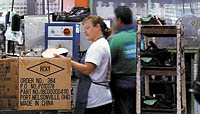
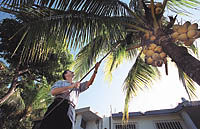
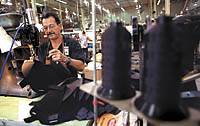

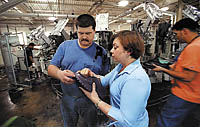
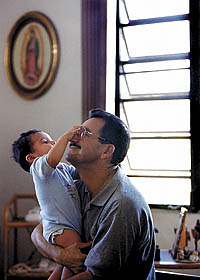 ----------
----------